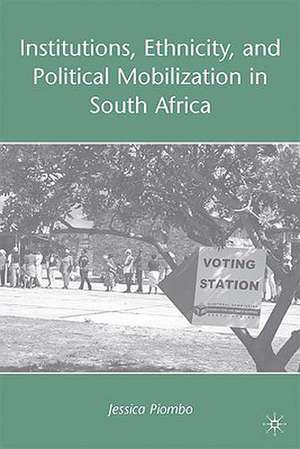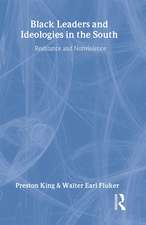Institutions, Ethnicity, and Political Mobilization in South Africa
Autor J. Piomboen Limba Engleză Hardback – 13 oct 2009
| Toate formatele și edițiile | Preț | Express |
|---|---|---|
| Paperback (1) | 384.31 lei 6-8 săpt. | |
| Palgrave Macmillan US – 8 noi 2015 | 384.31 lei 6-8 săpt. | |
| Hardback (1) | 387.75 lei 6-8 săpt. | |
| Palgrave Macmillan US – 13 oct 2009 | 387.75 lei 6-8 săpt. |
Preț: 387.75 lei
Nou
Puncte Express: 582
Preț estimativ în valută:
74.20€ • 80.85$ • 62.52£
74.20€ • 80.85$ • 62.52£
Carte tipărită la comandă
Livrare economică 23 aprilie-07 mai
Preluare comenzi: 021 569.72.76
Specificații
ISBN-13: 9780230617346
ISBN-10: 0230617344
Pagini: 260
Ilustrații: XVI, 260 p. 3 illus.
Dimensiuni: 140 x 216 x 18 mm
Greutate: 0.41 kg
Ediția:2009
Editura: Palgrave Macmillan US
Colecția Palgrave Macmillan
Locul publicării:New York, United States
ISBN-10: 0230617344
Pagini: 260
Ilustrații: XVI, 260 p. 3 illus.
Dimensiuni: 140 x 216 x 18 mm
Greutate: 0.41 kg
Ediția:2009
Editura: Palgrave Macmillan US
Colecția Palgrave Macmillan
Locul publicării:New York, United States
Cuprins
Ethnic Mobilization During Democratization Shaping Strategies of Political Mobilization South Africa's Political Institutions and Social Divisions Electoral Politics in South Africa, 1994 – 2004 The ANC: Playing to Win The New National Party: Transforming itself into Irrelevance From Democratic Party to Democratic Alliance: Mobilizing Minority Power? The Inkatha Freedom Party: De-Mobilizing Ethnic Power The Contingent Nature of Political Mobilization Bibliography
Recenzii
'Jessica Piombo offers an innovative and provocative explanation for why post-apartheid South Africa has avoided the siren song of ethnic politics that so many scholars predicted would emerge to dominate its new democracy. Rather than any shifts in the social identifies of its citizens, the incentives implied in its new political institutions have (perhaps unwittingly) led its major political parties to de-emphasize the activation of ethnic identities or the courting of regional minorities, and concentrate instead on the pursuit of national power through broad-based campaign appeals. The irony, however, is that these same institutions also work to insulate the countries elected leaders from day to day citizen influence. Piombo thus offers a new, theoretically rooted perspective on a fundamental conundrum of South Africa's emerging democracy.' - Robert Mattes, Professor of Political Studies at the University of Cape Town and Director of the Centre for Social Science Research
Notă biografică
JESSICA PIOMBO is an Assistant Professor and Regional Coordinator for Sub-Saharan Africa in the Department of National Security Affairs at the Naval Postgraduate School (NPS), USA.



















